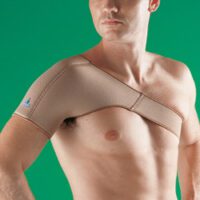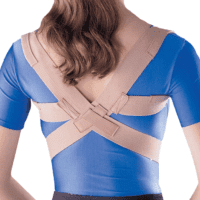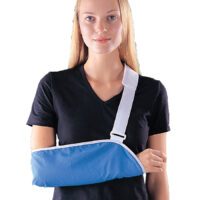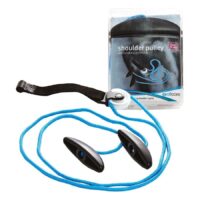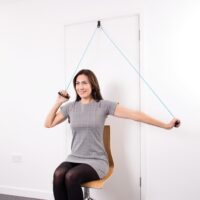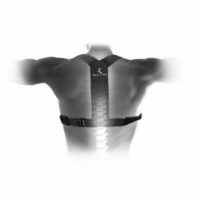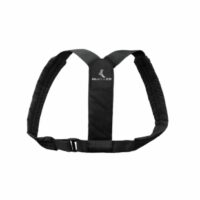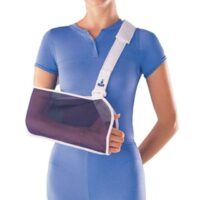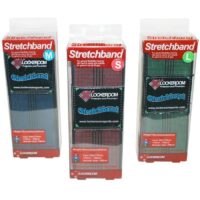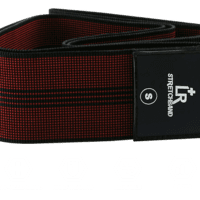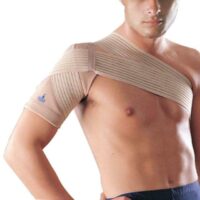Post-Operative Shoulder Physiotherapy
Article by John Miller

Post-Operative Shoulder Physiotherapy
Introduction
Undergoing shoulder surgery is a significant step towards regaining your shoulder’s full functionality and strength. However, the surgery itself is just the beginning of your journey to recovery. Post-operative shoulder physiotherapy plays a crucial role in ensuring a successful outcome. This comprehensive guide, brought to you by PhysioWorks, delves into the importance of physiotherapy after various shoulder surgeries and outlines what patients can expect during their rehabilitation process.
The Importance of Post-Operative Physiotherapy
After shoulder surgery, such as rotator cuff repair, AC joint stabilisation, or shoulder replacement, physiotherapy becomes essential. It’s not just about quick recovery; it’s about achieving the best possible outcome. With a tailored rehabilitation program supervised by a skilled physiotherapist, patients often experience faster recovery and better overall outcomes.
Early Post-Operative Phase
Immediately following surgery, you’ll begin with basic post-operative exercises. These initial steps are critical for preventing complications such as stiffness or excessive scar tissue formation. During this phase, your hospital physiotherapist will focus on gentle exercises to maintain joint mobility and reduce swelling.
After your discharged from hospital is the most likely time that your PhysioWorks physiotherapist will take over your post-operative shoulder rehabilitation.
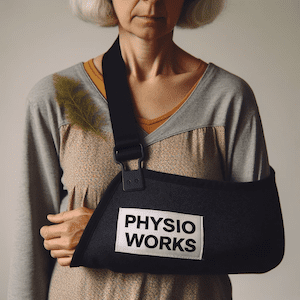
Progressive Physiotherapy Rehabilitation
As you recover, your physiotherapy program will evolve. Based on your surgeon’s recommendations and your progress, your physiotherapist will introduce more advanced exercises. These exercises aim to restore your range of motion, rebuild muscle strength, enhance flexibility, and improve overall shoulder function.
At the same time it is critical to protect your repaired tissue. Physiotherapist supervision is essential for the best outcome.
Specialised Procedures and Their Rehabilitation Approaches
Rotator Cuff Repair Recovery:
This involves specific exercises to strengthen the shoulder muscles without overloading the repaired tendons.
Related article: Rotator Cuff Tears
AC Joint Surgery Rehabilitation:
Focuses on stabilising the shoulder girdle and regaining full shoulder function.
Related article: AC Joint Injury
Shoulder Stabilisation Procedures:
Tailored exercises to stabilise the shoulder and prevent recurrent dislocations.
Related articles: Shoulder Dislocation, Shoulder Instability.
Arthroscopic Shoulder Surgery Recovery:
Emphasises on minimising pain and inflammation post-surgery, followed by gradual strength and mobility exercises.
SLAP Repair Physiotherapy:
Special attention is given to restore the stability of the shoulder joint and prevent further labral injuries.
Frozen Shoulder Post-Op Rehab:
Involves techniques to regain mobility and reduce shoulder capsule tightness.
Related articles: Frozen Shoulder.
Biceps Tenodesis Recovery Program:
Focuses on restoring bicep function and preventing strain on the repaired tendon.
Related articles: Biceps Tendinopathy.
Shoulder Fracture Post-Surgical Care:
Prioritises safe healing of the fracture while maintaining as much shoulder function as possible.
Related articles: Fractured Shoulder.
Pectoralis Major Surgery Rehabilitation:
Aims to rebuild chest and shoulder strength while protecting the repair site.
Reverse Shoulder Replacement Therapy:
Custom exercises to adapt to the altered biomechanics of the shoulder.
Consulting a Physiotherapist
At PhysioWorks, our physiotherapists are well-versed in post-operative treatment protocols for various shoulder surgeries. We work closely with your surgeon to ensure that your rehabilitation plan is aligned with your specific surgical procedure.
The Latest in Shoulder Rehab Research
Recent studies emphasise the importance of early mobilisation and customised exercise programs post-surgery. Tailored exercises based on individual progress and surgical specifics have been shown to significantly improve recovery outcomes. Moreover, incorporating new techniques like aquatic therapy and virtual reality exercises are gaining traction for their effectiveness in enhancing range-of-motion and reducing pain.
Conclusion
Successful recovery from shoulder surgery isn’t just about the surgery itself; it’s equally about the post-operative care and physiotherapy that follows. Adhering to a physiotherapist-guided rehabilitation program ensures a quicker and more effective recovery, helping you return to your daily activities with improved shoulder function.
What to Do?
If you’ve undergone or are planning to undergo shoulder surgery, it’s crucial to have a post-operative physiotherapy plan in place. Contact PhysioWorks to discuss your specific surgery and get started on your customised post-operative shoulder rehabilitation plan. Remember, your recovery is our priority, and we’re here to guide you every step of the way.





